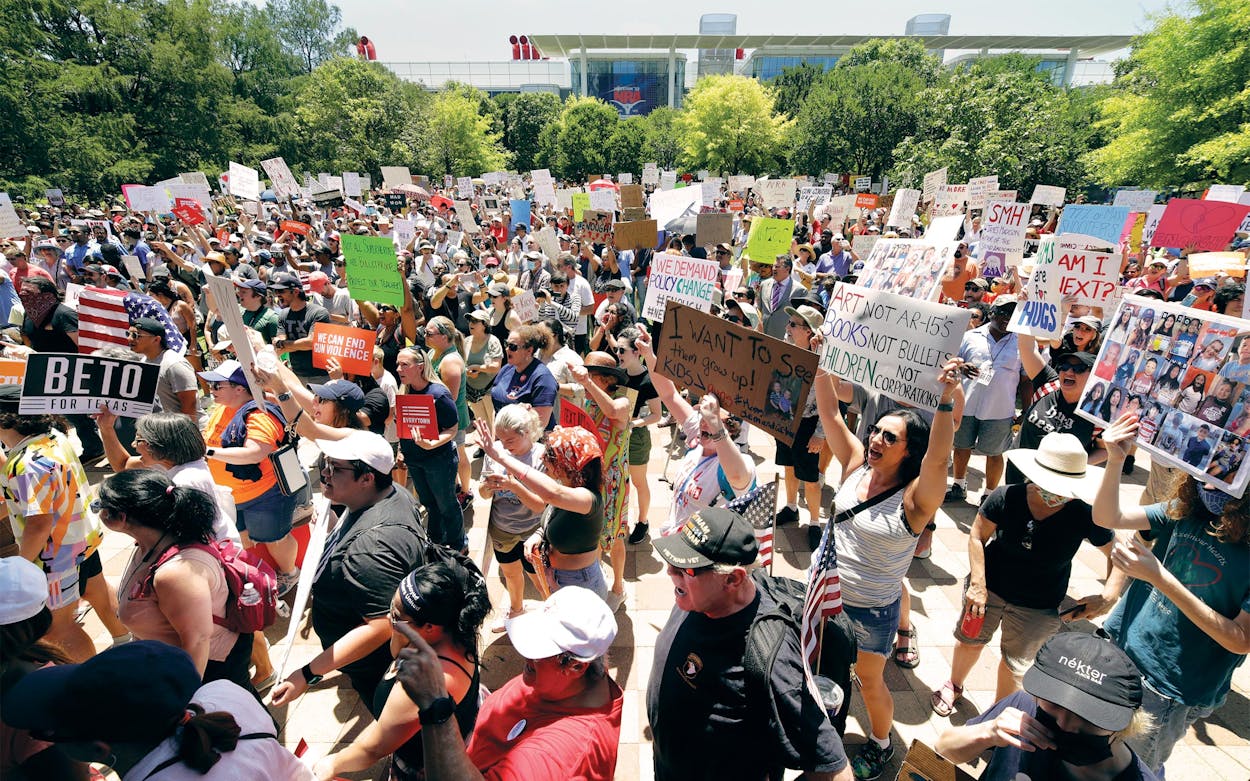The protesters carried bullhorns, loudspeakers, and drums. They carried homemade signs: “Ban Assault Weapons Now,” “Protect the Born,” “The Gun Lobby Is Killing Americans,” “F— Your Guns.” They carried pictures of the nineteen children murdered in Uvalde on Tuesday and lists of past school massacres. They carried campaign signs and voter registration forms. The thousands of protesters who gathered Friday afternoon at Discovery Green, outside the George R. Brown Convention Center in downtown Houston—which was hosting the National Rifle Association’s annual convention—were in no way violent, but they were done being polite.
Separated from the convention center by a low metal security fence, a two-lane street, and several dozen police officers, the protesters hurled invective at the bewildered-looking convention-goers, who were easily identified by the oversized badges on their lanyards. One woman stood alone at the fence, pointing silently across the street at the convention center, holding up a sign reading “NRA Shame.” Another protester screamed “Your child next!” at a group of NRA members gobbling hamburgers at a picnic table beneath a sign advertising “14 Acres of Guns and Gear.” Someone shouted, “The blood is on your hands!” The NRA members ignored the jeers.
Lauren Sander, who teaches a bilingual kindergarten class in Houston, came to the protest with her eleven-month-old daughter. She stood in the shade, pushing her daughter’s stroller back and forth, holding a sign that read “Is My Class Next?” In a rare moment of communication between NRA members and protesters, a stocky man with a buzz cut and an Apple watch approached Sander and attempted to engage her in conversation before entering the convention. He identified himself as a 37-year-old NRA member named Jason who taught gun safety courses. His shirt read, “Black Guns Matter,” which, he explained, was the name of a Black-led gun rights group.
“When they wrote the Second Amendment, they could not have known about guns that would shoot so many bullets,” Sander told him. “They could not have known about assault rifles, semiautomatic rifles.” Jason, who declined to provide his last name, attempted to disagree, but Sander kept talking. “There’s a fundamental problem when you value access to guns over the lives of children and teachers. I was scared to come here today with my daughter because I don’t know if I’m going to get shot.”
Later, after Sander walked away, Jason told me that he had spent the day trying to correct the “misconceptions” of gun control proponents. “But they don’t want to hear that,” he said. “They just want to talk about their emotions, versus factual things.”
When asked about Uvalde, he said he felt terrible about the massacre—“I’m all about protecting kids”—but doesn’t believe stricter gun laws are necessary. I asked him what he thought about the gun restrictions at the convention and a ban on firearms during former president Donald Trump’s address. “It’s a private event, and they can dictate whatever they want,” he said. But wouldn’t it be safer to have more armed people—more “good guys with guns”—in the audience? “There’s an entire group of them in there,” he said, referencing Trump’s Secret Service detail.


In another part of the park, I met Miranda Garcia, a 31-year-old human resources manager. Garcia came to the protest because her mother teaches fifth-grade math in Corpus Christi. She held a sign reading, “Teachers Need Funds, Not Guns”—a common sentiment among educators, who often point out that Texas ranks thirty-ninth among the states in per-pupil spending on education. The day before the Uvalde shooting, she said, her mother’s school held an active shooter drill. The kids had joked about how silly the exercise seemed. “You don’t know where it will happen next,” Garcia said. “Uvalde was a wake-up call for everyone.”
Well, maybe not everyone. U.S. senator John Cornyn and Lieutenant Governor Dan Patrick canceled their planned speeches at the NRA convention. Governor Greg Abbott submitted a taped video address dismissing proposals for stricter gun regulations. It aired at almost the same time as a press conference he held in Uvalde, in which he said he might call a special legislative session to pass school-security bills but declared that restrictions on firearms would not solve gun violence. Among prominent Texas politicians, only Senator Ted Cruz kept his date with the NRA—perhaps not surprisingly, given the $176,284 he has received from the organization over his decade-long political career. Cruz blamed violent video games for the rise in mass shootings and called for fortifying schools rather than strengthening gun laws, which he said “don’t work.”
While many Republican officials are avoiding Houston this weekend, Democrats poured in. At an outdoor amphitheater in Discovery Green, far from any NRA members, a roster of activists, organizers, and politicians addressed a capacity crowd of sign-waving, angry-as-hell protesters. “Our descendants are looking back on this moment from the future to see if we are going to stand and fight for them or leave them to the slaughter,” said Democratic gubernatorial candidate Beto O’Rourke, who has been calling for an assault weapons ban since a white supremacist from Allen killed 23 people in El Paso in 2019. “We cannot be found wanting.”
O’Rourke, however, struck a more conciliatory attitude than most of the protesters. “To those attending the NRA convention across the street, you are not our enemies,” he said. “We are not yours. We extend our hands, open and unarmed, in a gesture of peace and fellowship to welcome you to join us to make sure that this no longer happens in this country.” But that offer came with an expiration date. “The time for you to join us is now,” O’Rourke said. “We cannot wait any longer for you.”
- More About:
- Politics & Policy
- NRA
- Ted Cruz
- Greg Abbott








